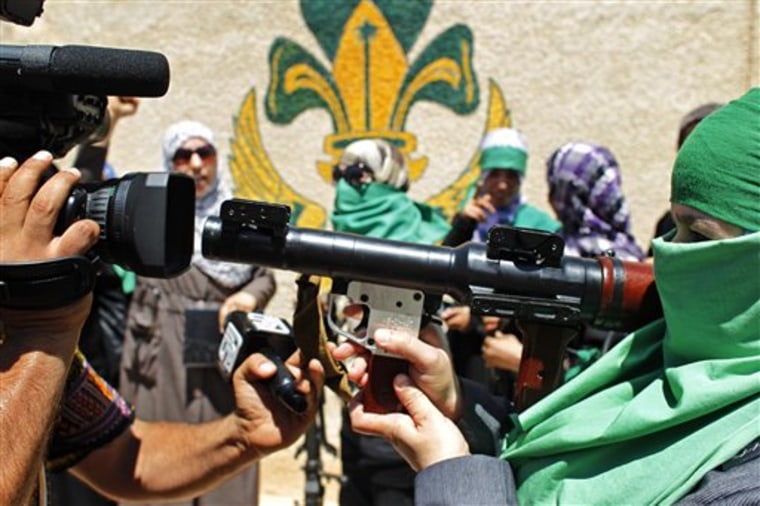Moammar Gadhafi's regime sought Sunday to show it remains in control of parts of the country's western mountains and will defend the territory against further rebel advances there.
The Nafusa mountains southwest of Tripoli have become a key battleground in the rebels' fight to oust the longtime Libyan leader, with small bands of fighters trying to inch closer to the capital by seizing villages along major roads snaking across the rugged highland terrain.
Forces loyal to Gadhafi are also battling rebels on two major front lines to the east of the capital, but neither side has been unable to mount a major push.
Journalists based in Gadhafi's stronghold of Tripoli were taken Sunday by government officials to the mountain gateway town of Gharyan and the nearby town of al-Assabaa, where they were shown armed civilians and government troops who vowed to defend their land.
"All the people here, like other Libyans, they are armed," said Hamooda Mokhtar al-Salem, a top government official in al-Assabaa.
A portrait of Gadhafi was perched on the table in front of him, and a Kalashnikov rifle rested against the wall. "We are ready to fight to protect our land, our leader ... our children. NATO cannot scare us," he told reporters.
A crowd outside the government building where he spoke chanted pro-Gadhafi slogans and shot bursts of automatic fire into the air.
The town lies down mountain roads not far from a village rebels said they seized last week. Gharyan is the bigger of the two and is the last mountain town along a highway that leads straight to the capital Tripoli, just 50 miles (80 kilometers) to the north.
In Gharyan, a small group of women practiced to fire automatic rifles and unloaded grenade launchers. They were far outnumbered by visiting journalists.
Tripoli-based foreign journalists are routinely accompanied by government minders whose presence makes it difficult for people to speak freely. Government-arranged trips tend to be carefully orchestrated.
On Wednesday, rebels claimed to have taken the mountain village of Qawalish, which sits about 10 miles (16 kilometers) by winding mountain road from al-Assabaa. Gharyan is about 12 miles (20 kilometers) further away.
Libya's deputy foreign minister, Khaled Kaim, last week accused NATO of intensifying its bombing campaign, including in the western mountains, to lay the groundwork for a rebel advance toward the capital. He said the alliance targeted police checkpoints in the mountains before the rebel advance on Qawalish.
NATO denies that it is using its air power to intentionally aid rebel advances, saying it is sticking to its mandate to protect civilians.
NATO began airstrikes against Libya in March. The coalition and its Arab allies are operating under a U.N. mandate.
Some countries in the coalition have interpreted that mandate broadly, with France acknowledging it has provided weapons to rebels operating in the mountains and other countries providing non-lethal aid to rebel-held areas.
